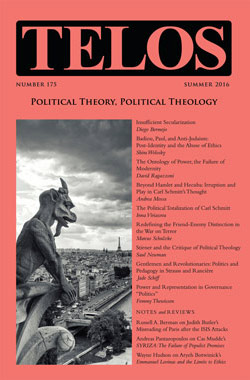Inna Viriasova’s “The Political Totalization of Carl Schmitt: Deciding on ‘the Absolutely Unpolitical'” appears in Telos 175 (Summer 2016). Read the full article at the Telos Online website, or purchase a print copy of the issue in our online store.
 While “the political” is among the most studied aspects of Carl Schmitt’s thought, little attention has been paid to the notion of “the unpolitical,” which, I argue, plays a crucial role in understanding the totalizing status of the political. This essay, first, illuminates the symptomology of Schmitt’s political totalization; it shows how, despite its claim to autonomy, the political emerges as the total: an infinite potential that consumes human life as a whole. Second, this essay argues that the institution of political totality essentially relies upon the elimination of its radical outside—the “absolutely unpolitical.” Throughout his writings Schmitt presents the unpolitical as a merely “fictitious” reality. Meanwhile, what remains obscured is an originary event, the decision on the absolutely unpolitical, which institutes a pre-political field and thus grounds any subsequent political decision. Schmitt fails to fully acknowledge that any political decision rests upon the prior elimination of the real unpolitical field, the heterogeneous domain of life, and upon the establishment of a homogeneous medium that enables the very distinction between the identities of a friend and an enemy. In the end, this essay argues that Schmitt’s proclamation of the political as the total depends on the elimination of the absolutely unpolitical, which we might encounter, for instance, in the heterogeneity of non-human forms of life.
While “the political” is among the most studied aspects of Carl Schmitt’s thought, little attention has been paid to the notion of “the unpolitical,” which, I argue, plays a crucial role in understanding the totalizing status of the political. This essay, first, illuminates the symptomology of Schmitt’s political totalization; it shows how, despite its claim to autonomy, the political emerges as the total: an infinite potential that consumes human life as a whole. Second, this essay argues that the institution of political totality essentially relies upon the elimination of its radical outside—the “absolutely unpolitical.” Throughout his writings Schmitt presents the unpolitical as a merely “fictitious” reality. Meanwhile, what remains obscured is an originary event, the decision on the absolutely unpolitical, which institutes a pre-political field and thus grounds any subsequent political decision. Schmitt fails to fully acknowledge that any political decision rests upon the prior elimination of the real unpolitical field, the heterogeneous domain of life, and upon the establishment of a homogeneous medium that enables the very distinction between the identities of a friend and an enemy. In the end, this essay argues that Schmitt’s proclamation of the political as the total depends on the elimination of the absolutely unpolitical, which we might encounter, for instance, in the heterogeneity of non-human forms of life.



